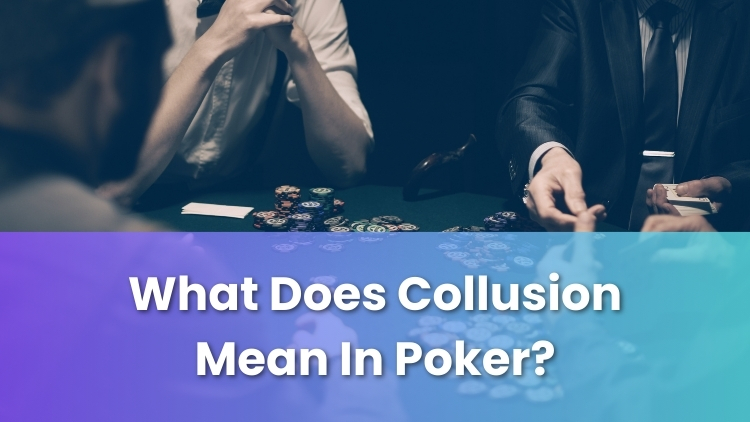
Whether you're playing poker at a land-based casino or online, understanding the basic rules and possible behaviours is essential.
But what happens when players bend those rules? One term you might come across is "collusion." This might sound complicated, but don't worry—it's something many people want to understand properly.
In this post, we'll look into what collusion means in the world of poker.
What Does Collusion In Poker Mean?
In poker, collusion happens when two or more players secretly work together to try to gain an unfair advantage over other players at the table; this collaboration can sometimes happen in both live and online poker games.
The players involved might agree to share information about their hands, which is information other players do not have. This may help them make better decisions about betting, folding, or raising, giving them a significant edge.
Collusion can also involve signalling each other through gestures or coded language. These actions are usually attempts to alter the outcome of a game in their favour.
While poker is designed to be a competitive game where each player acts independently, collusion undermines this fairness. It's considered cheating and is taken seriously by both physical casinos and online platforms.
Recognising collusion is an important step in maintaining a fair and enjoyable poker experience for everyone. Knowing about it may help you stay vigilant and play with integrity.
Is Collusion In Poker Legal?
Collusion in poker is not legal. It is considered a form of cheating and breaks the rules of fair play. Whether playing online or in a casino, poker should be a game of equal competition, where everyone has an equal chance to potentially win based on their own skills, decisions and chance.
When players engage in collusion, they disrupt the balance of the game. This affects everyone at the table and tarnishes the experience. Therefore, poker rooms and online platforms have strict rules against collusion.
Casinos and online poker sites use various methods to try and detect and prevent collusion. If players are caught colluding, they can face serious consequences. This might include being banned from the casino or site, and possibly even legal action.
How Does Collusion Work In Poker?
Collusion in poker happens when players secretly cooperate to unfairly influence the outcome of a game. This underhanded teamwork may give them an advantage over others who are playing by the rules.
A common method of collusion involves players sharing information about their hands. By knowing the cards held by their partners, they can make more informed decisions about whether to bet, fold, or raise.
Another tactic is signalling. Players might use gestures, coded words, or even specific betting patterns to communicate with each other. This helps them coordinate their actions without appearing obvious to the rest of the table.
In online poker, collusion can occur through external communication. Players on a call or messaging platform might discuss their hands in real-time. This violates the integrity of the game and is against the rules.
How Is Collusion Prevented In Poker?
Preventing collusion in poker is important to keep the game fair for everyone. Both land-based casinos and online poker rooms use various strategies to try and tackle this issue.
In live poker games, dealers and floor staff keep a close eye on the action. They watch for any unusual behaviour or patterns that might suggest players may be working together. If they spot anything suspicious, they can investigate further.
Online poker platforms use sophisticated software to detect collusion. This technology analyses betting patterns and other gameplay data to try and identify any irregularities that might indicate collusion.
Some online platforms also use anonymous tables. These can prevent players from recognising each other, which reduces the risk of collusion.
Players themselves are an essential part of preventing collusion. By playing honestly and reporting any suspicious activity to the casino or platform, everyone can contribute to keeping the game fair.
Overall, these measures work together to ensure poker is played in a fair environment.
**The information provided in this blog is intended for educational purposes and should not be construed as betting advice or a guarantee of success. Always gamble responsibly.
